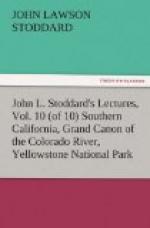It was sunset when our train, having crossed this river, ran along its western bank to our first stopping-place in California,—the Needles. Never shall I forget the impression made upon me as I looked back toward the wilderness from which we had emerged. What! was that it—that vision of transfiguration—that illumined Zion radiant with splendor? Across the river, lighted by the evening’s after-glow of fire, rose a celestial city, with towers, spires, and battlements glittering as if sheathed in burnished gold. Sunshine and distance had dispelled all traces of the region’s barrenness, and for a few memorable moments, while we watched it breathlessly, its sparkling bastions seemed to beckon us alluringly to its magnificence; then, fading like an exquisite mirage created by the genii of the desert, it swiftly sank into the desolation from which the sun had summoned it, to crown it briefly with supernal glory. Turning at last from its cold immobility to the activity around us, I saw some representatives of the fallen race of California, as Indian bucks and squaws came from their squalid hovels to sell the trifling products of their industry, and stare at what to them is a perpetual miracle,—the passing train. Five races met upon that railroad platform, and together illustrated the history of the country. First, in respect to time, was the poor Indian, slovenly, painted and degraded, yet characterized by a kind of bovine melancholy on the faces of the men, and a trace of animal beauty in the forms of the young squaws. Teasing and jesting with the latter were the negro porters of the train, who, though their ancestors were as little civilized as those of the Indians, have risen to a level only to be appreciated by comparing the African and the Indian side by side. There, also, was the Mexican, the lord of all this region in his earlier and better days, but now a penniless degenerate of Old Castile. Among them stood the masterful Anglo-Saxon, whose energy has pushed aside the Spaniard, civilized the Negro, developed half a continent, built this amazing path of steel through fifteen hundred miles of desert, and who is king where-ever he goes. While I surveyed these specimens of humanity and compared them, one with another, there suddenly appeared among them a fifth figure,—that of Sing Lee, formerly a subject of the oldest government on earth, and still a representative of the four hundred millions swarming in the Flowery Kingdom. Strangely enough, of all these different racial types, the Mongol seemed the most self-satisfied. The Yankee was continually bustling about, feeding passengers, transporting trunks, or hammering car-wheels; the Negroes were joking with the Indians, who appeared stolidly apathetic or resigned; the Mexicans stood apart in sullen gloom, as if secretly mourning their lost estate; but Sing Lee looked about him with a cheerful calmness which seemed indicative of absolute contentment and his face wore, continually, a complacent smile. What strange varieties of human destiny these men present, I thought as I surveyed them: the Indian and the Mexican stand for the hopeless Past; the Anglo-Saxon and the Negro for the active Present; while Sing Lee is a specimen of that yellow race which is embalmed in its own conservatism, like a fly in amber.




